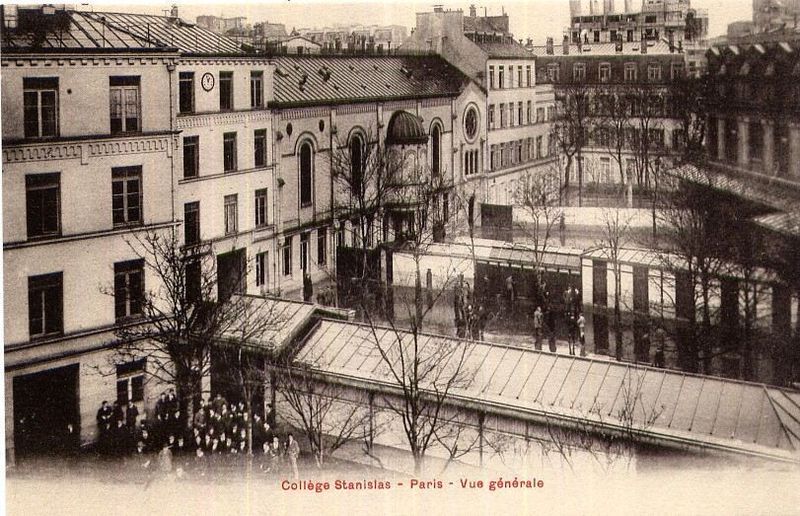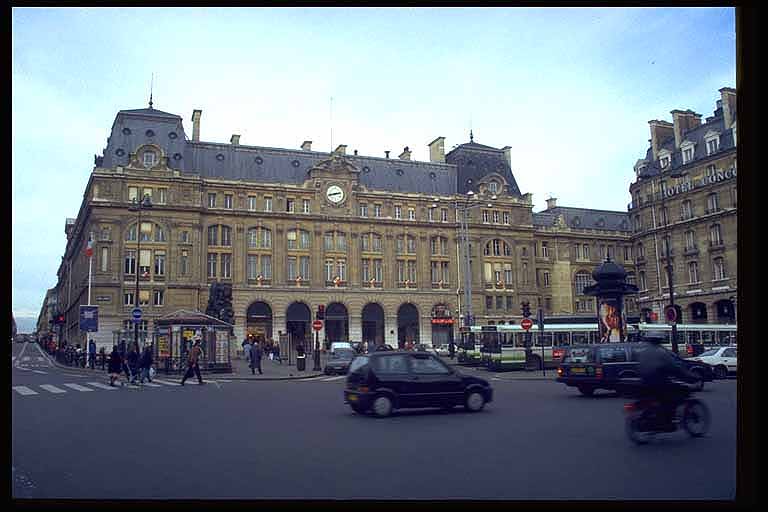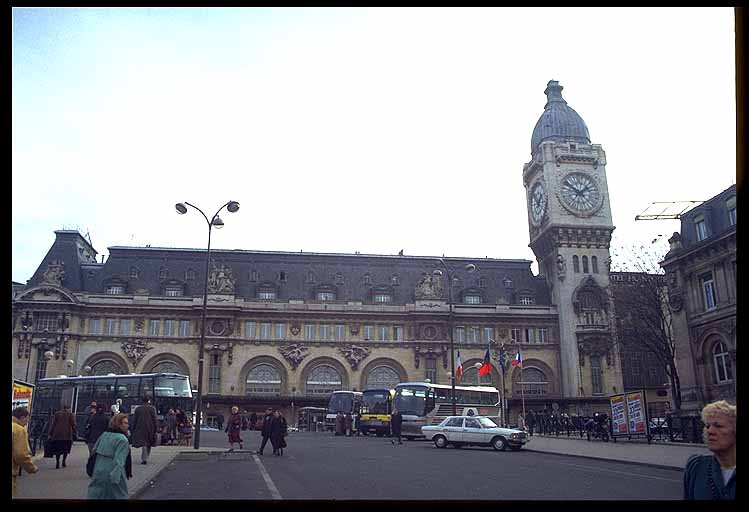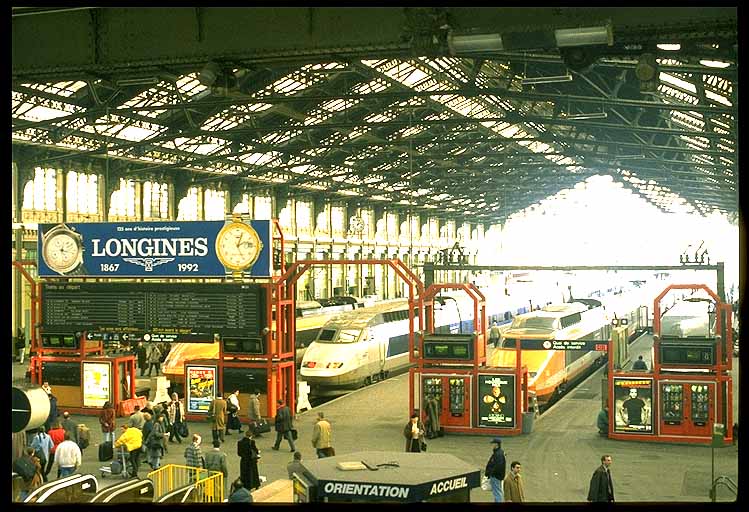The First Time I Saw Paris
The first time I saw Paris, I expect her heart was young and gay; but personally, I had troubles of my own.
I had just turned fifteen. I had managed to get my 'O' levels (which is an English Exam which qualified one for what was then called the Sixth Form) the previous Summer. I was now going to specialize in Languages. Despite the fact that I had never been to France, nor indeed met a French person nor heard one speak, I had managed to score 96% in French, for which achievement my Auntie Peggy had decided to reward me with a trip to Paris.
Not all by myself, of course. She sent me on one of Miss Williams's trips.
Miss Williams was a formidable lady, either Principal or Vice-Principal of Hereford Grammar School, who organized each year in the Spring two trips to Paris; one for boys, one for girls. The idea was to familiarize Sixth-formers (High School Juniors to you Americans) with the advanced study of French Language and Literature. She advertised these outings to all the Public Schools in England. Public Schools, of course, are not public. They are Private Schools with ivy on them. Such was Miss Williams' reputation by the time I went in the trip, that from an original party of about a hundred, the organization had swollen to well over a thousand on each occasion. On my trip there were 1,200 boys.
Organizing exercises on a battalion level offers economies of scale. No need to buy a railway ticket for each student; one can simply hire a special train. Or two, to be precise. And for the Channel crossing, a special boat. More special trains on the French side, and a fleet of buses to take the boys and their accompanying teacher volunteers to the various Parisian boarding schools which were to accommodate them. My own school, in the wilds of Yorkshire, was Spartan to say the least. Dormitory windows were not constructed so as to shut, and one woke up several times each winter to a light dusting of snow on the pillow. Nevertheless, conditions at the Lycée Stanislas came as a surprise.

The place resembled one of those hospitals one sees illustrated in books about the Crimean war; only here there was no Florence Nightingale wandering about with a lamp and an eagerness to cool our fevered brows. Anyway, in Paris in late March, the nights are insufficiently warm to render such an exercise necessary. The place was bare. The walls were bare, the floors were bare, the bedclothes were threadbare. Public schoolboys, however, are resilient individuals, and soon everybody was sitting around wrapped in blankets and singing Rugby songs, many hitherto unknown to me, and of a particularly intense lewdness. Some of the Scottish boys, especially, knew songs and stories that would unquestionably, given the chance, have brought the blush of shame to the cheek of modesty – even, I suspect, to the cheek of a fairly experienced lower-deck sailor. Perhaps it had something to do with the fact that our first dinner, like all main meals for the week, had been accompanied by wine. This was my first taste of an alcoholic beverage, and luckily, I thought it was terrible. Looking back, I can see that this was partly because, as wine, it was terrible.
Next morning, we were marched round to the Sorbonne for our first lecture. It was about the playwright Racine. It was horrible. For a start, Racine was a writer of whom P.G.Wodehouse once said that, if he knew any jokes, he kept them to himself. The lecture was in the very spirit of the author, and probably monumentally dull. I say probably, because it all went clean over the top of my head. I may have done well in the exam, but remember that this was the first time I had heard French actually spoken. It might just as well have been Navajo.
After lunch, therefore, when all my colleagues trooped back into the hallowed halls to hear about Corneille, another seventeenth-century dramatist with better plots than Racine's but a similar sense of humour, I set off to explore Paris. I walked the fascinating streets from the Latin Quarter and into Montparnasse, where I decided to sample the delights of a café terrace. The little bar I selected was called Chez Madame Jean, in the Rue de Rennes. It was small and homely, with the traditional zinc-topped bar and Madame Jean herself behind it, large and billowy and opulent. 'Un café, s'il vous plaît' I requested, and a small black coffee was accordingly supplied. This, I found I liked.
Over the next few days, I became one of Madame Jean's regular customers. I did not attend any further lectures at the Sorbonne, a policy which stood me in good stead in the future. I have attended one lecture at the University of Marburg in Germany, where I spent three months, and one at the University of Clermont-Ferrand, a French town where I lived and studied for two semesters. In Paris, I initiated a lifelong habit of wandering. I bought a set of ten métro tickets and began to explore. I got to know the Left Bank pretty well on foot, the Right Bank by train, and I met with no unpleasantness until the third day, when I took it into my head to go to the movies.

Brigitte Bardot had just burst upon the scene at that time, and the French cinema was never the same again. The same can be said for me. The film that brought her to the notice of the world was And God Created Woman (Et Dieu Créa la Femme). Bardot's character married a young man, worked her way through his brothers, and carried on something alarming with an older gentleman played by Curt Jurgens. In the opening scene, Curt arrives at her place, lifts a corner of a sheet hanging out to dry, and there she is, Sunbathing, face down, dressed exactly as she was when she came into the world. The first scene is a good sample of the rest of the film.
I went into the cinema at eleven o'clock in the morning. The film lasted an hour and a half. Then they showed it again. I came out just after five o'clock. I had to get back to the Lycée Stanislas for dinner, otherwise I should probably be there yet. I had discovered Woman, a commodity in very short supply at an English boarding-school. My gratitude to Miss Bardot is deep and alive to this day.
What I failed to discover, in the dormitory that night, was my wallet. Either my pocket had been picked while I was absorbed in the screen, or I had simply mislaid the thing. I went back to the cinema the next day, but if anybody had found the wallet, nobody was about to tell me so. I had enough loose change to buy my coffee, but that was all.
There still remained to me two métro tickets. Enquiries at the local station (Notre-Dame-des-Champs) revealed that the Lost Property Office was ten stops down the line, so with the optimism of youth I hopped on the train. The optimism, however, was unjustified. The Lost Property Office did not have my wallet. It seemed to amuse the employees that I even thought they might. It occurred to me that this was the lowest point of my life so far, and that nothing could possibly happen to make my situation worse. Still, I had one ticket left to get me back to base. It was folded carefully inside my passport. Unfortunately, the passport seemed to have disappeared. My pockets were now completely empty. Somewhere between the Lycée and my present location, the passport had gone the way of the wallet. So there I was, marooned in Paris, several miles from where I ought rightly to have been – at the Sorbonne, drinking in useful information about The Nineteenth-Century Novel.
To this day, I am downright proud of what I did next. I went to see the stationmaster of the station where I happened to be, and told him that I had lost my passport. Had anybody found it at his station? No, they had not. I explained that I had neither money nor ticket, but that I should like to proceed to the next station on the line and see if my passport had been found there. He escorted me personally to the platform and explained to the little old lady who sat all day punching holes in tickets that it was permitted for me to pass. I took the train to the next station, where I went to see the stationmaster and repeated the process with the same result. The same story worked in the same way with all ten stationmasters – but not one of them had found my passport.
The boys in the dormitory were sympathetic. My activities had aroused a small amount of curiosity and envy, and many of them knew me for that reason. They had a whip-round and contributed a few mites of English change. Nobody was prepared to hand over French money, which was all earmarked for presents for family and so on. The change amounted to one English pound. A plutocrat from Eton or Harrow or some such place was good enough to exchange it for a pound note, armed with which I sallied forth into the City of Light for my last day's wandering.
There were in those days draconian restrictions on the possession and exchange of foreign currency. Knowing this, I did not dare go into a bank and change my pound note for the 1,374 francs it was worth. I had to use the Black Market. There was a man on the corner of the Rue de Rennes who sold souvenirs of various sorts, and who advertised that he took British and American money. I bought a necktie for a hundred francs and handed over my pound note. He gave me nine hundred change. When I pointed out that a pound was worth considerably more that a thousand francs, he recommended me to try a bank. I was not amused.
I bought a few small things that day, and as the next day was our last in Paris, planned to spend the remaining 500 francs on presents for the family. Alas for human ambition, I went first to Chez Madame Jean, where I fell for the first time into conversation with my genial hostess. My French was impeccable while I was ordering coffee, but beyond that its deficiencies showed up only too well. After a few minutes' chat I was marked down as a foreigner, and when I paid for the coffee with my 500-franc note, she gave me change for 100. It had already become plain that I had not the linguistic ammunition for an argument. That was the first time I was ever cheated in Paris, and I wish to state, for the honor of the French nation, that it was also the last. Robbed I have been, oh yes, but not cheated. Indeed, at a later time, when my eight-year-old daughter's purse was stolen at the flea market, a nearby stallholder was so outraged that he insisted on reimbursing her the few francs she had lost. The pickpocket, he said, could not have been French.
There remained, before returning home, a duty which filled me with dread. I had to confess the loss of my passport to Miss Williams. This turned out to be less unpleasant than I had expected. I should have realized, of course, that any group of 1,200 boys will always include one idiot who loses things. My punishment – though it was not described as such – was to travel in the company of the lady herself, so that she could take me with her to the passport inspection and explain. 'Is he British?' asked the official. 'Don't be flippant", said Miss Williams, and we were waved through.
Once back in London, I went to the Passport Office and stood in line before a high window manned by a fearsome ogre who towered over the small boy that I was. 'If you please, Sir', I groveled, 'What do I do if I've lost my passport?' 'Well', he growled, 'when you've done your fourteen days in jail, you get another one.' He was joking, but the fact was not immediately apparent.
* * * * * * * * * * * * * * * * * * * * * * * * * * * * * * * * * * * * * * *
I did not return to France for six years. By that time, I was a student at the University of Leeds, and languages students were sent to spend time in the countries of their chosen languages. I did three months in Germany, failing miserably to improve my German due to the fact that every German I met was a student who wanted to improve his English. The next move was a year in France, assisting the teaching of English in a Lycée in Clermont-Ferrand. To get to that city, one had to pass through Paris.
I was sartorially an unusual student. I did not possess a pair of jeans or a backpack, preferring to affect a dark suit, usually accompanied by a rolled umbrella and a leather briefcase. Everything that did not fit in the briefcase was packed in a large cabin trunk. The railway people suggested that such an article should be registered through to one's destination, but I could just lift the thing and resolved to take it with me as hand luggage. I had heard lurid tales of registered luggage disappearing for months on end.
I took a train from Leeds to London, where I boarded the Boat train for Newhaven. On arrival, I collected the trunk from the guard's van of the train and lugged it on board the boat. Several porters offered their assistance (that was what porters did in those far-off days), but I understood that they would want money for this service, and refused. I stowed trunk, briefcase and umbrella in a handy rack and adjourned to the lounge. There I found several fellow-students also bound for their year in France. The journey promised to be interesting, as one of these fellow-travellers was Tony Evans, a noted joker. Sometimes his jokes took a disturbing turn. On the way to Germany the previous year the train stopped at the border, and a huge German Customs Officer slid open the door of our compartment and barked 'Passporten, bitte!'. Meekly, we surrendered our passports, strove to look innocent while claiming to have nothing to declare, and watched the colossus slide the door shut again. Just before it closed (his timing was off that day), Tony called out, 'Thank you, darling'.
The door slid open again. the man's head, complete with moustache, cheesecutter cap and menacing expression, reappeared. He fixed Tony with a terrible eye, paused for exactly the right length of time, and replied, 'Und you, sveetheart.'
It soon became apparent, however, that Tony's capacity for amusement would be in abeyance on this trip. The weather was foul, the sea rough, the boat small. Nobody felt terribly well. At first, people were politely sick into the English Channel, but soon the trip to the ship's rail became too much bother. I remember watching one girl in a cross-gangway that led across the ship from side to side. She had a bowl into which she was attempting to vomit. Every time she threw up, the ship would roll and the bowl went skidding from port to starboard or vice versa, returning to her just too late to be of any practical help. It was that sort of crossing.
The three-hour voyage took about six hours, but the Paris train waited for us. Nobody said much on the journey, we were too busy recovering and thanking our lucky stars that we wouldn't have to board that boat again for several months. The train pulled into Saint-Lazare station where we bade each other farewell and proceeded independently to our various assignments.

I had planned the crossing of Paris with some care, considering the sort of thing that had happened to me last time. I was due to depart from the Gare de Lyon at midnight, in three and a half hours' time. It should have been over six hours, but there was still plenty of margin. What I intended to do was to take the special bus which goes round all the main-line stations, check my luggage into the consigne at the Gare de Lyon, and spend a little time exploring the area around that station. Accordingly, I dragged my trunk down the platform, handed in my ticket, found the inter-station bus and took a seat.
The bus went from Gare Saint-Lazare to Gare du Nord, and was on its way from there to the Gare de l'Est when it occurred to me that the ticket I had handed in was a through ticket to Clermont-Ferrand. With an effort, I quelled my rising panic. After all, I still had three hours. I would stay with the bus, get off at the Gare de Lyon as planned, deposit the luggage and return to Gare Saint-Lazare to retrieve the ticket.

At the Gare de Lyon, the consigne refused my trunk. 'That', said the official, 'is not hand luggage. We only take hand luggage. Heavy luggage must be registered through to your destination.'
I argued the point. I postulated that the trunk must be hand luggage, since I had it in my hand. This cut no ice. I would have pressed the point, but at that moment I realized that my umbrella and briefcase were not with me.
I had left them on the bus.
Brendan Behan, the Irish playwright, used to tell a story of a person he met who experienced a similar sensation to mine at this point. He was walking down O'Connell Street in Dublin one day, when he saw coming towards him one of the market women in a state of considerable undress. Her bodice was unbuttoned and large portions of her anatomy open to the public gaze. Rushing up to her, Brendan cried, 'Cover yerself up, woman, ye're not dacent.' The woman looked down at her chest and raised a horror-stricken face. 'Holy Mary', she whispered, 'I've left the baby on the bus.'
Let us recapitulate. I am at the Gare de Lyon, which is in the East of Paris. My ticket is at the Gare Saint-Lazare in the North-West. My briefcase and brolly are on a bus which plies between six main-line stations. I explained all this to the left-luggage official, who proposed a compromise. He could not take the trunk into his official care, but if I left it just outside his consigne, he would keep an eye on it. Meanwhile, the office of the bus company was at Gare du Nord – in the North of the city.
Still not panicking, at least not obviously, I descended to the métro, bought some tickets and proceeded to the Gare du Nord, where after only a few minutes' search I found the bus office. The lady there was much more accommodating. She telephoned various other ladies, explaining my predicament to each in turn and harvesting the laughter it caused. After a few minutes, she had what she plainly considered good news. Yes, my brolly and briefcase had been found. They were waiting for me in the Lost Property depot at the Gare d'Austerlitz, across the river from the Gare de Lyon.
Well, at least I now knew where everything was.
And I still had the best part of two hours. With luck, the thing could be done. And almost immediately, the luck kicked in. I took the métro back to Gare Saint-Lazare and asked where the ticket might be. Tickets, they told me, went to the Regional Office on Platform Ten. I went to Platform Ten. It was lined with offices, all regional. There must have been a dozen of them. I chose one at random and went in. Hardly had I opened my mouth when the clerk said, 'Oh, you must be the idiot who handed in a ticket to Clermont-Ferrand!.'
The night was very dark by this time. Underground, however, the métro was as bright as ever. I had to change trains to get to the Gare d'Austerlitz, and all the way I was in a fever of impatience (not panic, you understand, just impatience) in case the bus office should have closed for the night. The Austerlitz métro station is on an elevated line, high up in the roof of the main-line station.

I rattled down the fifty stairs and round to the bus office. Relief! It was open till midnight, and I was reunited with briefcase and umbrella. I had half an hour to make the ten-minute journey to Gare de Lyon. Thanking the bus clerk, I walked calmly back up the stairs to the métro line.
It had closed for the night.
Late-strolling Parisians were treated to the sight of a young Englishman, in a dark suit and a muck sweat, belting at fearsome speed across the Pont d'Austerlitz and up the Boulevard Diderot towards the Gare de Lyon, from which the midnight train to Clermont-Ferrand would depart in – counting from his entry to the station – three minutes' time.

First, the consigne. Trunk still there. Shout thanks to the clerk. Hold on to brolly and briefcase with left hand, drag trunk with right towards Platform 22, where a bell starts ringing to announce the departure of the train. Wave ticket at inspector, dash through closing barrier. Inspector gives chase. 'Hey! You can't take that trunk! It isn't hand luggage!' Begin to argue. First six carriages are First Class. Run and argue past them. A Second-class door beginning to close. Launch trunk into opening. Inspector still expostulating. Leap through door over trunk. Inspector yelling. Wrench trunk out of door. Door closes. Inspector visible, purple in face, mouth opening and closing, but inaudible. Train starts. Collapse into seat. Mop sweat.
And, you'll never believe this, but it was the right train.